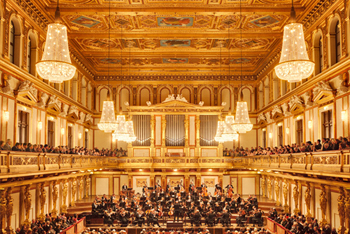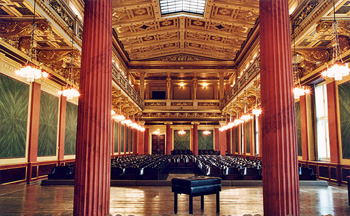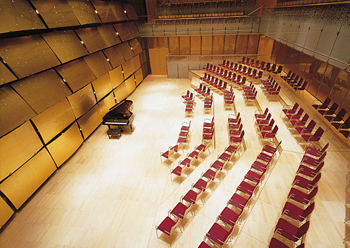ORF RSO Vienna
Mo | Tu | We | Th | Fr | Sa | Su |
Program and cast
TUESDAY, JUNE 4, 2024 - 7:30 p.m
ORF RSO Vienna
Maxime Pascal, conductor
Xavier de Maistre, harp
PROGRAM
RICHARD WAGNER
Siegfried idyll
PETER EÖTVÖS
Concerto for Harp and Orchestra (Austrian premiere)
– Intermission –
PETER EÖTVÖS
Reading Malevich
BÉLA BARTÓK
The wonderful Mandarin. Concert suite, op. 19
Ends approximately 9:30 p.m
THURSDAY, JUNE 20, 2024 - 7:30 p.m
ORF RSO Vienna
Peter Joyce, conductor
Samuel Couffignal, conductor
Johann-Sebastian Guzman, conductor
Piotr Jaworski, conductor
Sung-Chan Lee, conductor
PROGRAM
ARNOLD BAX
Symphonic poem “Tintagel”
SERGEI PROKOFIEV
Symphony No. 1 in D major, op. 25, “Symphonie classique”
ANTONÍN DVOŘÁK
The Midday Witch. Symphonic poem after K. Jaromir Erben for large orchestra, op. 108 (“Polednice”)
– Intermission –
FRANZ LISZT
Les Preludes. Symphonic poem after Lamartine for large orchestra (tone poem No. 3)
SERGEI PROKOFIEV
Romeo and Juliet. Suite from the ballet, op. 64
Ends approximately 10:00 p.m
FRIDAY, OCTOBER 11, 2024 - 7:30 p.m
ORF RSO Vienna
Maxime Pascal, conductor
Truls Mørk, cello
PROGRAM
ARNOLD SCHÖNBERG
Five pieces for orchestra, op. 16
HENRI DUTILLEUX
Tout un monde lointain.... Concerto for cello and orchestra
CLAUDE DEBUSSY
Images for orchestras
Ends approximately 9:30 p.m
THURSDAY, DECEMBER 12, 2024 - 7:30 p.m
ORF RSO Vienna
Marin Alsop, conductor
Gabriela Montero, piano
PROGRAM
GABRIELA ORTIZ
Antropolis
GABRIELA MONTERO
Concerto for Piano and Orchestra No. 1, “Latin Concerto”
– Intermission –
JESSIE MONTGOMERY
“Strum” for string orchestra
SAMUEL BARBER
Symphony No. 1, op. 9
Ends approximately 9:30 p.m
SUNDAY, JANUARY 19, 2025
ORF RSO Vienna
Chorus of the Society of Music Friends in Vienna
Oksana Lyniv, Conductor
Anna Prohaska, Soprano
Miriam Kutrowatz, Soprano
Anna Lucia Richter, Mezzo-Soprano
Johannes Bamberger, Tenor
PROGRAM
JOHANN STRAUSS II
Choral pieces, grand waltzes, polkas, as well as arias, duets, and ensembles from his operettas
WEDNESDAY, JANUARY 29, 2025 - 7:30 p.m
ORF RSO Vienna
Marin Alsop, conductor
Matthias Goerne, baritone
PROGRAM
SAMUEL BARBER
Adagio for strings, op. 11
JOHN ADAMS
The wound dresser
– Intermission –
DMITRI SHOSTAKOVICH
Symphony No. 10 in E minor, op. 93
Ends approximately 9:20 p.m
FRIDAY, MARCH 7, 2025 - 7:30 p.m
ORF RSO Vienna
Kevin John Edusei, conductor
Camille Thomas, cello
PROGRAM
ANNA CLYNE
“Dance” for cello and orchestra
JOHANN STRAUSS SOH
Romance for cello and orchestra No. 2, op. 255
MAURICE RAVEL
La Valse. Poème chorégraphique pour Orchestra
MAX RICHTER
Exiles
Ends approximately 9:30 p.m
SUNDAY, MAY 18, 2025 - 7:30 p.m
ORF RSO Vienna
Singing club of the Society of Music Friends in Vienna
Marin Alsop, conductor
Dana Marbach, soprano
Annette Schönmüller, mezzo-soprano
Adrian Eröd, baritone
Wolfgang Kogert, organ
PROGRAM
ALEXANDER ZEMLINSKY
13th Psalm, op. 24
ERICH ZEISL
Requiem Ebraico. The 92nd Psalm for soloists, mixed choir, organ and orchestra
– Intermission –
GUSTAV MAHLER
Symphony No. 1 in D major
Ends approximately 9:45 p.m
THURSDAY, JUNE 19, 2025 - 7:30 p.m
ORF RSO Vienna
PROGRAM
Orchestra concert - diploma examination in conducting of the mdw
Ends approximately 10:00 p.m
Musikverein Golden Hall
This building is located on Dumbastraße/Bösendorferstraße behind the Hotel Imperial near the Ringstraße boulevard and the Wien River, between Bösendorferstraße and Karlsplatz. However, since Bösendorferstraße is a relatively small street, the building is better known as being between Karlsplatz and Kärntner Ring (part of Ringstraße loop). It was erected as the new concert hall run by the Gesellschaft der Musikfreunde, on a piece of land provided by Emperor Franz Joseph I of Austria in 1863. The plans were designed by Danish architect Theophil Hansen in the Neoclassical style of an ancient Greek temple, including a concert hall as well as a smaller chamber music hall. The building was inaugurated on 6 January, 1870. A major donor was Nikolaus Dumba whose name the Austrian government gave to one of the streets surrounding the Musikverein.
Great Hall - Golden Hall
 “As high as any expectations could be, they would still be exceeded by the first impression of the hall which displays an architectural beauty and a stylish splendour making it the only one of its kind.” This was the reaction of the press to the opening of the new Musikverein building and the first concert in the Großer Musikvereinssaal on 6 January 1870.
“As high as any expectations could be, they would still be exceeded by the first impression of the hall which displays an architectural beauty and a stylish splendour making it the only one of its kind.” This was the reaction of the press to the opening of the new Musikverein building and the first concert in the Großer Musikvereinssaal on 6 January 1870.
The impression must have been overwhelming – so overwhelming that Vienna’s leading critic, Eduard Hanslick, irritatingly brought up the question of whether this Großer Musikvereinssaal “was not too sparkling and magnificent for a concert hall”. “From all sides spring gold and colours.”
Brahms Hall
 "In order not to promise too much it can be said that it has been made into the most beautiful, most magnificent, perfect example of a chamber concert hall that any of us knows in the world.” This was the reaction of a Vienna daily newspaper in October 1993 as the Brahms-Saal was presented to the public after extensive renovation work.
"In order not to promise too much it can be said that it has been made into the most beautiful, most magnificent, perfect example of a chamber concert hall that any of us knows in the world.” This was the reaction of a Vienna daily newspaper in October 1993 as the Brahms-Saal was presented to the public after extensive renovation work.
The surprise was perfect. It was a completely new hall. In contrast to the Grosse Musikvereinssaal, the Brahms-Saal had changed its appearance quite considerably over the years. When and how it acquired that slightly melancholy duskiness that was known to music lovers before 1993 cannot be precisely documented.
Glass Hall
 As a venue for events from concerts to luxury banquets, the Glass Hall / Magna Auditorium is not only the largest of the Musikverein's 4 new halls but also the most flexible in terms of usage.
As a venue for events from concerts to luxury banquets, the Glass Hall / Magna Auditorium is not only the largest of the Musikverein's 4 new halls but also the most flexible in terms of usage.
Hub podiums enable the smooth transformation of the concert hall into a conference centre, the cinema into a ballroom, or the stage into a catwalk. State-of-the-art equipment for sound, lighting, video and widescreen digital projection provide the ideal conditions for half-scenic productions.
The Glass Hall / Magna Auditorium was designed by the Viennese architect Wilhelm Holzbauer. With a height of 8 metres, the hall (including the gallery) can play host to up to 380 visitors.
Performances: Fr 16 May 2025,
Performances: Su 25 May 2025,
Performances: Su 10 Nov 2024,
Performances: Su 11 Aug 2024,
Performances: Sa 27 Jul 2024,
Performances: We 26 Feb 2025, 09:00

 EN
EN DE
DE IT
IT FR
FR ES
ES RU
RU JP
JP RO
RO
 Seating plan
Seating plan 









